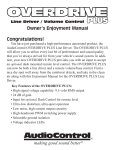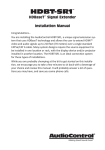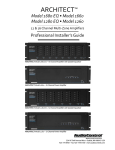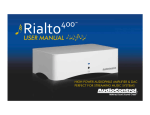Download Audio Control LC7i Install guide
Transcript
Quick Install Guide Six Channel Line Output Converter with Multi-Channel Equalization and AccuBASS™ The LCQ-1 is your gateway to amazing sound from a factory head unit. It is a compact, six-channel, high-performance, OEM line output converter with independent multichannel equalizers to custom tune the system. AudioControl’s patent pending AccuBASS™ compensation corrects for the factory bass roll-off present in many of today’s cars. In short; the LCQ-1 can make every car sound amazing. If you want even more, add the optional dash mounted level control (ACR-2) which allows control of the subwoofer output. The ACR-2 will also operate as an in/out switch for the EQ section. Very handy addition! Key Features of The LCQ-1 Here are some of the cool things that your LCQ-1 does: • Independent Front, Rear, and Subwoofer equalizers let you custom tune your system • AccuBASS™ bass compensation, so you can correct for the factory bass roll off, Patent Pending • GTO™ - signal-sensing inputs to turn the LCQ-1 on automatically • Channel summing lets you eliminate any factory-installed active crossovers • Active speaker-level inputs accept high power factory amplifier outputs • AutoMode Inputs turn 2 inputs into 3 outputs • Compact size for quick, easy installation • Input for optional ACR-2 remote mounted bass level control • Bulletproof 5 year warranty (When installed by an authorized AudioControl dealer) Want to know more? See the “Awesome Information” section, page 8 …it’s all there! ® Making Good Sound Better® ® Since some of you will want to install your LCQ-1 on your own we offer a few reminders in the following short section to speed up your installation of the: You should also refer to diagrams on page 9 and 10 as guidelines. ➊ Physically mount the LCQ-1 in a location that keeps it away from soda spills, food crumbs, and curious fingers. Select a location that allows you access to the top panel equalization controls. ➋ The LCQ-1 needs to be installed in the signal path between your OEM source unit (or factory amplifier) and after-market amplifier(s) and/or processor(s). Do not connect the LCQ-1 between the factory head unit and the factory amplifier. Locate the amplified speaker wires that are coming from your factory source unit and/or amplifier and connect them to the speaker-level inputs on your LCQ-1. In many cases you can find factory speaker leads in the rear of the vehicle or at the factory amplifier that are easy to access. Note: If your source unit has front, rear, and subwoofer speaker-level outputs, connect them to the three sets of inputs on your LCQ-1. If the source unit only has front and rear outputs, the Auto Mode circuitry in your LCQ-1 automatically routes the Channel 2 input channels to the (Channel 3) subwoofer channels. ➌ Use RCA connecting cables to connect the RCA outputs of the LCQ-1 to your after market amplifier(s). If this is not obvious to you, quickly pack up your LCQ-1 and run to your nearest authorized AudioControl dealer to have them perform the installation. You will thank us later. ➍ Connect +12 power, and ground. Note: The LCQ-1 has a 12-volt trigger input but normally you will just let the GTO turn on circuit take care of that by itself. ➎ Connect your amplifier trigger input to the 12-volt trigger output of the LCQ-1. ➏ Turn your amp gains fully down before turning on the system. ➐ Turn on the system and level match your LCQ-1 to your source unit, signal processor and amplifiers. For more help see our technical videos at http://www.audiocontrol.com/t34/Mobile-Audio.html ➑ Set your equalization controls so the system sounds amazing. See page 9 for more details. If you have your authorized AudioControl dealer install your LCQ-1, we will extend the normal one-year warranty to a full five years. AudioControl products are, by nature, more technical than many others and we spend a good deal of time training our dealers and installers so we know our products will be installed correctly. We do this so you will get the best possible results from your AudioControl purchases. For the best results this tuning should be done by page one of two people, someone with perfect pitch, “golden ears” (these are very rare) or a person with a great deal of tuning experience. A Real Time Analyzer (RTA) is a great tool to have at this point as well. An RTA reads the audio response in your car and displays it visually so your AudioControl dealer can quickly and accurately tune your LCQ-1 to give you AudioControl Real Time Analyzer the best possible sound in your car. A Guided Tour of LCQ-1 ➊ Speaker-level Inputs: The LCQ-1 has six speaker-level inputs. These inputs get their signals from the speaker-level outputs of your factoryinstalled source unit or amplifier. If your source unit has front, rear, and subwoofer speaker-level outputs, connect them to the three sets of inputs on your LCQ-1. If the source unit only has front and rear outputs, the Auto Mode circuitry in your LCQ-1 automatically routes the Channel 2 input channels to the (Channel 3) subwoofer channels. ➋ Equalizer Controls: To custom tune your system, the LCQ-1 gives you dedicated equalization controls for the Front, Rear, and Subwoofer outputs. ➌ AccuBASS™: The Threshold and level controls let you determine when the AccuBASS™ circuit starts bass correction and the level of correction applied. (See page 8.) ➍ Ground: Connect to a good, verified chassis ground (the battery comes to mind.) Warning: Factory ground wires already have multiple devices connected to them and are not recommended. ➎ +12V Power: Connect to a good source of 12-volt power (the battery comes to mind again). ➏ Remote In: In some unusual installations, you may not want to use the Figure 1. Basic system using Factory Radio. (If the factory stereo does not have a sub out, the LCQ-1’s AutoMode circuit will give you one) front rear need to be full range. GTO™ to turn on your system. For these cases the LCQ-1 can be turned on remotely with a +12-volt trigger. When you use the +12-volt remote in, you can set the internal GTO™ jumper (see “Under the Covers” below) to “Defeat”. This will prevent the car’s computer from turning the system on unexpectedly. ➐ Remote Out: Outputs 12 volts when the LCQ-1 is powered up, so you can turn on external devices like signal processors and amplifiers. ➑ Maximized Indicator: This brightly colored LED indicates when the signal level is just below clipping your LCQ-1. When properly level matched, this LED should flicker occasionally when your system is playing at its maximum volume level. ➒ Power: If you have connected all of your power wires correctly, this light should be bright red when your system turns on. ➓ Optional (ACR-2) Dash Mounted Control: You can add a multi-funcFigure 2: Factory Radio with remote mounted factory amplifier. Signals are summed inside the LCQ-1. tion dash control that allows you to set the level of the subwoofer. It also has an in/out switch for the equalizer function so you can hear the system before and after your tuning changes. Simply tap in the remote knob to compare the sounds. page ➋ ➊ ➓ ➌ ➐ ➏ ➎ ➍ Pre-Amp Outputs: These are the RCA plugs on the output side and should be connected to the next component after the LCQ-1, such as a crossover or amplifier. Do not connect any speakers directly to your LCQ1. Output Levels: These knobs allow you to adjust the signal level from your source unit to match the input of your after-market amplifiers. Most factory-installed source units have relatively high signal voltage output, which will require you to decrease the signal level. ➑ ➒ Channel Summed Indicators: Under the cover of your LCQ-1 are jumpers that will allow you to sum selected channels into the main (#1) channels. This is especially useful for factory-installed systems with actively crossed over speaker systems. These indicator LED’s let you know which channels are being summed into the main inputs. page Under the Covers - Internal Jumpers Here are the internal jumpers that allow you to customize your LCQ-1 for your particular installation. ➊ Output Summing Jumpers: Many of today’s better factory stereo ➍ systems include separately amplified and crossed over tweeters, midranges, and subs. If you are going to add your own amps and speakers to the car you will need to combine ➊ (or sum) these separate signals into ➌ a single full-range signal for the new system. With the LCQ-1, summing is a snap. The LCQ-1 has internal jumpers that allow you to select which input signals will be summed ➋ into the Main outputs. When the jumper is moved to the “Sum” position, there will also be a corresponding green indicator light on the front of the LCQ-1. The shipped-fromthe-factory setting is in the non-summed (Separate) position. ➋ Ground Isolation Selector: Occasionally alternator noise may appear in a system because the source unit and amplifier are using different grounding schemes. To help in this situation, we have provided alternative grounding connections. Make sure your system is turned OFF before you move these jumpers. We ship them in the Isolated position, which usually gives the best results. ➌ GTO™: Many cars can turn on the factory amplifier even if the source unit is off (Alarms, Cell phones, etc). To prevent this from turning your system on unexpectedly, you can bypass the GTO™ circuit by moving the GTO™ jumper, and using an applied 12-volts at the Remote In terminal. Using the jumper may result in some factory features not working fully. We ship them with the GTO™ in the “On” position ➍ AutoMode: Some cars have unusual signals on their speaker leads and will not be easily read by the AutoMode circuit. When this occurs you can manually turn off the AutoMode function. This is done by moving the internal AutoMode jumper to “Defeat”. In this mode, you will need signal on the Channel 2 inputs to output signals on the Channel 3 output. We ship them with the jumpers in the “On” position Awesome Information AccuBASS™ Processing Factory installed amplifiers and woofers are (unfortunately) not designed to reproduce bass at high volumes. Car manufacturers adapt to this by taking the bass out of the signal when you turn up the volume. AudioControl developed the patent pending AccuBASS™ circuit to restore bass. After a quick and easy one-time setting, the AccuBASS™ circuit takes over the bass just as the factory system rolls off. You get smooth, seamless, and rock solid bass response regardless of volume level. Figure 3: Shows how the AccuBASS™ operates to correct for the factory bass rolloff Setting the AccuBASS™ is a simple one-time operation: After you have hooked up the system and are playing music, play something with a good bass line, and set the volume at low. • On the LCQ-1, set the AccuBASS Level Control to 12:00 and set all the EQ controls to flat. • Turn the Threshold fully down (counter clockwise) • Now turn up the volume on your stereo until you hear the bass start to drop out in relationship to the high frequencies and leave the volume there • Turn up the Threshold control until you hear the bass come back up • Use the level control to fine tune the amount of bass remix you want You’re done! Now, every time the stereo gets to that volume, the AccuBASS™ will take over and re-equalize the bass. You have smooth seamless bass at all volumes, and with the level control you can even give it a little extra kick if you want. Your music your way! page More Highlights ACR-2 Dash Control (Purchased Separately) Summable Outputs Placement And Mounting The LCQ-1 has the capability to combine together multiple (2, 4, or 6) input signals from the factory source unit into 2 channels. In some vehicles there is an actively crossed over tweeter, midrange, and woofer all in the front of the vehicle. The LCQ-1 lets you take all of those signals and sum them together to get a high quality, full range, pre- amp signal. Simply move the summing jumper located under cover and near knobs for the desired channel into the “Sum” position. If the green LED for that channel is on, you know it is being summed into the main output. The ACR-2 dash control may be mounted under the dash using its own bracket or through a custom hole in the dash. It should be within reach of the driver and in a spot where the LED is plainly visible. AutoMode Inputs We have equipped your LCQ-1 with an AutoMode input that takes the channel 2 (rear) input signal and automatically feeds it to the channel 3 outputs to drive a subwoofer amp and crossover. This means your LCQ-1 will accept two input channels (say, Front and Rear) and give you three output channels (Front, Rear, and Sub). Optional Remote Level Control/EQ Switch The ACR-2 is a multi-function remote that gives you control over the level of the Channel 3/Subwoofer output so you can balance the bass level with the rest of the system. An additional feature of the ACR-2 dash remote is that it allows the equalization to be switched in and out of the audio circuit by tapping the switch. You can hear the system before and after the EQ adjustments. Bracket Installation The dash control mounts with two screws, which attach to the underside of the dashboard. Slide under the dash and place the dash control in its mounting position, mark the two mounting holes, drill pilot holes, and secure with two screws. Custom Installation For that custom, finished look, the dash control can be flush mounted directly on the dash-board (or anywhere else). Referencing the figure above, disassemble the dash control from the mounting bracket. Start by pushing the LED from its holder followed by removing the circuit board and rotary control from the bracket. Drill a 9/32 hole in the dashboard for the control along with Dash Control Assembly a 1/8 hole for the lock tab and a 13/64 hole for the LED holder. Reassemble the dash control components on the dashboard. page Unlimited System Possibilities Serious Sound for Classic Rock, Bands, Music, or Jazz Serious Sound for High SPL Systems page Serious Sound Quality System Using Summing Functions Equalization Adjustment When it comes to music, everyone has his or her own particular taste. Some people want pounding bass and crisp, blood curdling highs. Others may prefer a “flat” response (whatever the heck that is). At the end of the day, most people just want their system to sound balanced and “just like it did in the store” or similar to their buddy’s car. The following equalization guidelines should help you achieve your own personal audio nirvana. 1. For optimum performance, get your hands on a test compact disc that contains pink noise and a good quality RTA (real time analyzer); we happen to know someone who makes a really good one. If you cannot locate an RTA, you probably want to have your authorized AudioControl dealer perform the equalization adjustments as they will have one. You can certainly adjust your LCQ-1 using your ears, however an RTA will give you the best results. 2. Begin playing pink noise through your system and place the microphone for your analyzer on a microphone stand in the drivers seat. Take a careful look at the “curve” on your analyzer and how one frequency combines with the next. There is no one curve that will satisfy every person, as we all have different tastes. How else can you explain Liberace or rice cakes? The key is to use your LCQ-1 to help balance your system from one frequency to the next and give your speakers the sparkle, sizzle, detail or punch that the acoustics of the car have compromised. 3. You will want to start equalizing by removing or cutting any large bumps, peaks, or areas with too much energy at a particular frequency. Next, boost the ranges that do not have enough energy. We strongly recommend that you cut or decrease energy before you boost. 4. Although the plethora of knobs on your LCQ-1 can be intimidating, fear not as they were designed to give enough control to maximize your systems performance but not enough to get you in trouble. Here is an explanation of the key areas you should focus on: page Block Diagram of the LCQ-1 Feeling lost? Here’s an internal “roadmap” to help you out. This simplified block diagram is a map of the paths your signals take inside the LCQ-1. With this map you can follow each input through the processor. If you do have an issue with the hook-up of your LCQ-1 and need to call for technical assistance, please have this diagram available. We can help you trace the problem to get your system up and running. LCQ-1 SPECIFICATIONS All specifications are measured at 14.4 VDC (standard automotive voltage). As technology advances, AudioControl reserves the right to continuously change our specifications, like our Pacific Northwest weather although we are working on it. Maximum speaker-level input...............................400 watts per channel Maximum output level................................................................ 8.5Vrms Output gain................................................................................ +/-12 dB Frequency response............................................................. 10Hz-22kHz Total harmonic distortion . ............................................................ 0.01% Input Impedance ..................................................................... 20 Kohms Equalization Frequencies Front/Rear................125Hz, 250Hz, 500Hz, 1kHz, 2kHz, 8kHz Sub Output......................... 31.5Hz, 50Hz, 63Hz, 80Hz, 1000Hz Output Impedance.................................................................... 150 Ohms Power supply........................................High headroom PWM switching Power draw................................................................................... 350mA Recommended fuse rating .......................................................... 2 Amps Remote trigger max output current................................................ 1 Amp Size......................................................................8.6”W x 4.75”D x 1.2” Weight............................................................................................... 3 lbs ©2011 AudioControl, Inc. All rights reserved AudioControl, Making Good Sound Better, LCQ-1, AccuBASS, EQS, 6XS, GTO and AutoMode are all trademarks of AudioControl Inc. This manual was conceived, designed, and written while on a road through the Pacific Northwest on a spectacularly rare, sunny, and cloudless day. The top was down and country music was playing on the radio. ® Making Good Sound Better® ™ 22410 70th Avenue West Seattle, WA 98043 USA Phone 425-775-8461 • Fax 425-778-3166 www.audiocontrol.com P/N 913-108-0 page The WARRANTY LEGALESE SECTION People are scared of warranties. Lots of fine print, months of waiting around. Well, fear no more, this warranty is designed to make you rave about us to your friends. It’s a warranty that looks out for you and helps you resist the temptation to have your friend, “who’s good with electronics”, try to repair your AudioControl product. So go ahead, read this warranty, then take a few days to enjoy your new LCQ-1 before going on-line to register your unit at www.audiocontrolregistration.com We also look forward to your comments while you are registering your LCQ-1. “Conditional” doesn’t mean anything ominous. The Federal Trade Commission tells all manufacturers to use the term to indicate that certain conditions have to be met before they’ll honor the warranty. If you meet all of these conditions, we will warranty all materials and workmanship on the LCQ-1 for one year from the date you bought it (five years if it is installed by an authorized United States AudioControl dealer) We will fix or replace it, at our option, during that time. Here are the conditional conditions: 1. You have to go to www.audiocontrolregistration.com warranty and register your LCQ-1 within 15 days after purchase. 2. You must keep your sales receipt for proof of purchase showing when and from whom the unit was bought. We’re not the only ones who require this, so it’s a good habit to get into with any major purchase. 3. Your LCQ-1 must have originally been purchased from an authorized AudioControl dealer. You do not have to be the original owner, but you do need a copy of the original sales slip. 4. You cannot let anybody who isn’t: (A) the AudioControl factory; (B) somebody authorized in writing by AudioControl to service your LCQ-1. If anyone other than (A) or (B) messes with your LCQ-1, that voids your warranty. 5. The warranty is also void if the serial number is altered or removed, or if the LCQ-1 has been used improperly. Now that sounds like a big loophole, but here is all we mean by it. Unwarranted abuse is: (A) physical damage (don’t use the LCQ-1 for a car jack); (B) improper connections (120 volts into the power jack can fry the poor thing); (C) sadistic things. This is the best product we know how to build, but if you mount it to the front bumper of your car, something will go wrong. If an authorized United States AudioControl dealer installs the LCQ-1, the warranty is five years. Assuming you conform to 1 through 5, and it really isn’t all that hard to do, we get the option of fixing your old unit or replacing it with a new one. This is the only warranty given by AudioControl. This warranty gives you specific legal rights that vary from state to state. Promises of how well the LCQ-1 will perform are not implied by this warranty. Other than what we have covered in this warranty, we have no obligation, express or implied. Also, we will not be obligated for direct or indirect consequential damage to your system caused by hooking up the LCQ-1. Failure to register warranty information negates any service claims. ® Making Good Sound Better® ™ 22410 70th Avenue West • Seattle, WA 98043 USA Phone 425-775-8461 • Fax 425-778-3166 www.audiocontrol.com P/N 913-108-0 page



















